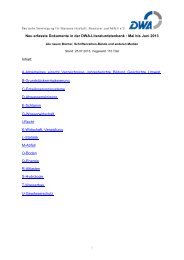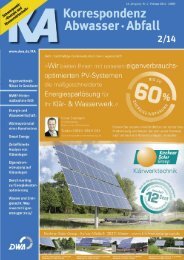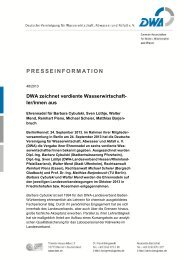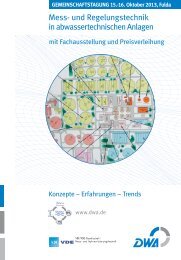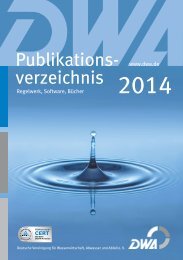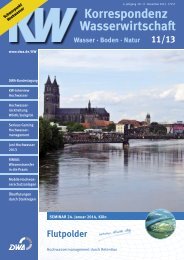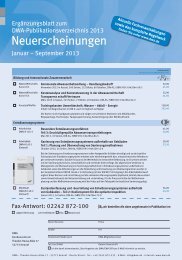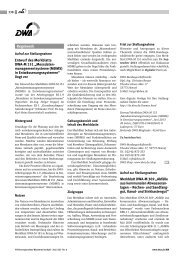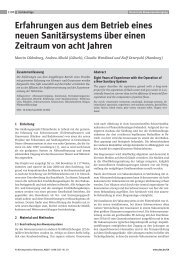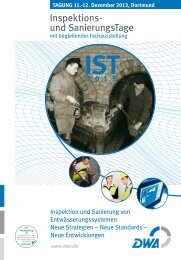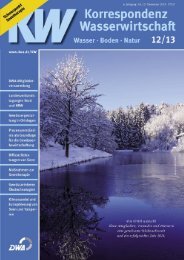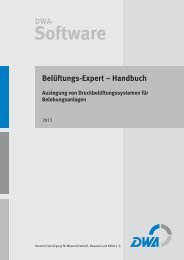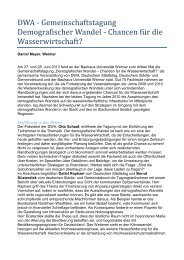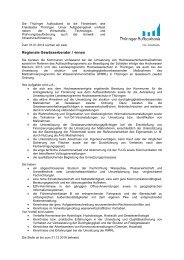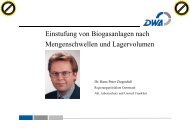Forschungsprojekte Anthropogene Spurenstoffe - DWA
Forschungsprojekte Anthropogene Spurenstoffe - DWA
Forschungsprojekte Anthropogene Spurenstoffe - DWA
Erfolgreiche ePaper selbst erstellen
Machen Sie aus Ihren PDF Publikationen ein blätterbares Flipbook mit unserer einzigartigen Google optimierten e-Paper Software.
<strong>Forschungsprojekte</strong> zu anthropogenen <strong>Spurenstoffe</strong>n im Wasserkreislauf<br />
73 Titel<br />
Kurztitel<br />
Verbundpartner/<br />
Projektnehmer<br />
Kontakt<br />
Projektträger/<br />
Finanzierung<br />
Laufzeit<br />
Assessment of Technologies for the Removal of Pharmaceuticals and<br />
Personal Care Products in Sewage and Drinking Water Facilities to<br />
Improve the Indirect Potable Water Reuse<br />
Poseidon<br />
Eawag, BfG,<br />
Tampere University of Technology, Finland<br />
Vienna University of Technology, Österreich<br />
University of Santiago de Compostela, Spanien<br />
Silesian University of Technology, Polen<br />
CIRSEE, Suez Environment<br />
Ecotoxicology GmbH ECT<br />
PD Dr. Thomas Ternes, BfG<br />
5. EU-Rahmenprogramm<br />
Kurzfassung<br />
Municipal wastewater contains a multitude of persistent organic compounds derived from<br />
domestic application such as active ingredients in pharmaceuticals and personal care<br />
products, which are used in large quantities throughout the world. Here both groups will be<br />
collectively referred to as "Pharmaceuticals & Personal Care Product ingredients" (PPCPs).<br />
PPCPs passing wastewater treatment systems are continuously infused to the environment<br />
via Waste Water Treatment Plants (WWTP) discharges and are present in the feeding water<br />
(groundwater, bank filtrates, surface water) of waterworks. In some cases even drinking<br />
water is contaminated with PPCPs. Pharmaceuticals are designed to induce specific<br />
biological effects at specific target organisms for a limited period of time. The continuous,<br />
wide spread, long-term exposure of PPCPs to the environment and humans, although at low<br />
concentration levels, may result first in gradual almost hardly detectable changes. However,<br />
in the long run significant impacts on the environmental and human health can not be<br />
excluded. In particular, the release of antibiotics into the environment may induce the<br />
development of resistant bacterial strains. To reduce the risks of unforeseeable long-term side<br />
effects of PPCPs to the environment and human health, and to circumvent a life-long<br />
consumption of low doses of potentially toxic PPCPs through drinking water, POSEIDON<br />
develops methods which will reduce the uncontrolled releases of PPCPs to the environment<br />
via wastewater. Further, POSEIDON intends to enhance efficient and unpolluted water<br />
supply and to specify the potential risks of PPCPs to the environment.<br />
Description of POSEIDON:<br />
Municipal wastewater contains a multitude of persistent organic compounds derived from<br />
domestic application such as active ingredients in pharmaceuticals and personal care<br />
products, which are used in large quantities throughout the world.<br />
Here both groups will be collectively referred to as "Pharmaceuticals & Personal Care<br />
Product ingredients" (PPCPs). PPCPs passing wastewater treatment systems are<br />
104



